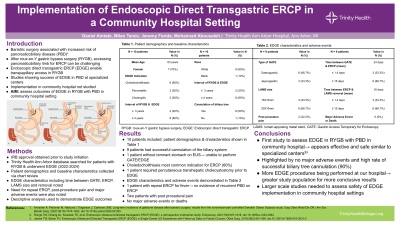Sunday Poster Session
Category: Interventional Endoscopy
P1058 - Implementation of Endoscopic Direct Transgastric ERCP in a Community Hospital Setting
Sunday, October 27, 2024
3:30 PM - 7:00 PM ET
Location: Exhibit Hall E

Has Audio

Daniel Aintabi, MD, MSc
Trinity Health Ann Arbor Hospital
Ann Arbor, MI
Presenting Author(s)
Daniel Aintabi, MD, MSc1, Milan Terzic, MD1, Jeremy Farida, MD2, Mohannad Abousaleh, MD2
1Trinity Health Ann Arbor Hospital, Ann Arbor, MI; 2Huron Gastro, Ann Arbor, MI
Introduction: Patients with bariatric surgery have been shown to be at increased risk of gallstone disease.1 In patients with roux-en-Y gastric bypass surgery (RYGB), accessing the pancreaticobiliary limb for endoscopic retrograde cholangiopancreaticography (ERCP) can be challenging. Endoscopic direct transgastric ERCP (EDGE) offers a means for endoscopic transpapillary access in RYGB. While studies have demonstrated success using EDGE procedures for management of PBD, its implementation in a community hospital setting has yet to be published. We aim to assess implementation of EDGE in RYGB patients with PBD in a community hospital setting.
Methods: Trinity Health Ann Arbor database was retrospectively searched for patients with RYGB that underwent EDGE from 2022-2023. Patient demographics and baseline characteristics were collected via electrical medical records. EDGE characteristics including time between GATE, ERCP, LAMS size and removal were collected. Need for repeat ERCP, post-procedure pain and major adverse events were also noted. Descriptive analysis was performed to assess the effectiveness and safety of EDGE.
Results: To date, 8 patients met inclusion criteria. Patient demographics and baseline characteristics were included. All patients had a history of RYGB. Seven patients had successful cannulation of the biliary system, with EDGE unable to be performed in one patient due to absence of remnant stomach on endoscopic ultrasonography. Choledocholithiasis and cholangitis were the most common indications for ERCP, with one patient requiring EDGE for acute pancreatitis with evidence of biliary sludge on MRCP. EDGE characteristics and adverse events are demonstrated below. One patient needed a repeat ERCP after a fever, however there was no evidence of recurrent pancreaticobiliary disease. Two patients reported post procedural pain and there were no major adverse events or deaths.
Discussion: This is the first study to assess implementation of EDGE in the community hospital setting. Our preliminary results suggest that EDGE is both effective and safe for management of RYGB patients with pancreaticobiliary disease in the community hospital setting. This is especially highlighted by the lack of major adverse events with a high success rate of biliary tree cannulation. With more EDGE procedures being performed in the community hospital setting, we are hopeful that a greater study population will be obtained for more conclusive results.
Note: The table for this abstract can be viewed in the ePoster Gallery section of the ACG 2024 ePoster Site or in The American Journal of Gastroenterology's abstract supplement issue, both of which will be available starting October 27, 2024.
Disclosures:
Daniel Aintabi, MD, MSc1, Milan Terzic, MD1, Jeremy Farida, MD2, Mohannad Abousaleh, MD2. P1058 - Implementation of Endoscopic Direct Transgastric ERCP in a Community Hospital Setting, ACG 2024 Annual Scientific Meeting Abstracts. Philadelphia, PA: American College of Gastroenterology.
1Trinity Health Ann Arbor Hospital, Ann Arbor, MI; 2Huron Gastro, Ann Arbor, MI
Introduction: Patients with bariatric surgery have been shown to be at increased risk of gallstone disease.1 In patients with roux-en-Y gastric bypass surgery (RYGB), accessing the pancreaticobiliary limb for endoscopic retrograde cholangiopancreaticography (ERCP) can be challenging. Endoscopic direct transgastric ERCP (EDGE) offers a means for endoscopic transpapillary access in RYGB. While studies have demonstrated success using EDGE procedures for management of PBD, its implementation in a community hospital setting has yet to be published. We aim to assess implementation of EDGE in RYGB patients with PBD in a community hospital setting.
Methods: Trinity Health Ann Arbor database was retrospectively searched for patients with RYGB that underwent EDGE from 2022-2023. Patient demographics and baseline characteristics were collected via electrical medical records. EDGE characteristics including time between GATE, ERCP, LAMS size and removal were collected. Need for repeat ERCP, post-procedure pain and major adverse events were also noted. Descriptive analysis was performed to assess the effectiveness and safety of EDGE.
Results: To date, 8 patients met inclusion criteria. Patient demographics and baseline characteristics were included. All patients had a history of RYGB. Seven patients had successful cannulation of the biliary system, with EDGE unable to be performed in one patient due to absence of remnant stomach on endoscopic ultrasonography. Choledocholithiasis and cholangitis were the most common indications for ERCP, with one patient requiring EDGE for acute pancreatitis with evidence of biliary sludge on MRCP. EDGE characteristics and adverse events are demonstrated below. One patient needed a repeat ERCP after a fever, however there was no evidence of recurrent pancreaticobiliary disease. Two patients reported post procedural pain and there were no major adverse events or deaths.
Discussion: This is the first study to assess implementation of EDGE in the community hospital setting. Our preliminary results suggest that EDGE is both effective and safe for management of RYGB patients with pancreaticobiliary disease in the community hospital setting. This is especially highlighted by the lack of major adverse events with a high success rate of biliary tree cannulation. With more EDGE procedures being performed in the community hospital setting, we are hopeful that a greater study population will be obtained for more conclusive results.
Note: The table for this abstract can be viewed in the ePoster Gallery section of the ACG 2024 ePoster Site or in The American Journal of Gastroenterology's abstract supplement issue, both of which will be available starting October 27, 2024.
Disclosures:
Daniel Aintabi indicated no relevant financial relationships.
Milan Terzic indicated no relevant financial relationships.
Jeremy Farida indicated no relevant financial relationships.
Mohannad Abousaleh indicated no relevant financial relationships.
Daniel Aintabi, MD, MSc1, Milan Terzic, MD1, Jeremy Farida, MD2, Mohannad Abousaleh, MD2. P1058 - Implementation of Endoscopic Direct Transgastric ERCP in a Community Hospital Setting, ACG 2024 Annual Scientific Meeting Abstracts. Philadelphia, PA: American College of Gastroenterology.
